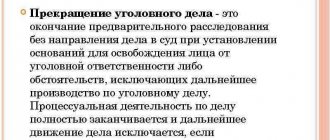Criminal Code of the Russian Federation in the latest edition:
Article 14 of the Criminal Code of the Russian Federation. Crime concept
1. A crime is recognized as a socially dangerous act committed guilty of guilt, prohibited by this Code under threat of punishment.
2. An action (inaction), although formally containing signs of any act provided for by this Code, but due to its insignificance, does not pose a public danger, is not a crime.
Return to the table of contents of the document: Criminal Code of the Russian Federation in the latest edition
Concept and signs of crime
Any crime is an act expressed in the form of active (action) or passive (inaction) behavior. A person’s thoughts, beliefs, his experiences, no matter how negative they may be, are not recognized as a crime according to the Criminal Code of the Russian Federation.
Part 1 of Article 14 of the Criminal Code of the Russian Federation contains a definition of the concept of “crime”, containing four signs that characterize it: illegality, public danger, guilt and punishability .
All four of these signs of a crime are interconnected and obligatory. Only their complete set allows us to speak of a socially dangerous act as a crime.
Wrongfulness means that an act is prohibited by criminal law. A ban as a legal regulation identifies an act as a crime. Russian criminal law, when defining the concept of “crime,” is based on the principle NULLum crimen sine leges (there is no crime unless it is specified in the law). An act becomes a criminal act only if it is prohibited by the Criminal Code of the Russian Federation, i.e. its description as a crime is given in the Criminal Code of the Russian Federation. The requirement that a criminal act must be provided for in the Criminal Code of the Russian Federation is usually called illegality. The principle of legality is implemented in the sign of illegality (Article 3 of the Criminal Code of the Russian Federation); it is also closely related to the provisions of Art. 8 of the Criminal Code of the Russian Federation, which defines the grounds for criminal liability.
Public danger is the main material sign of a crime. Public danger is inherent in any offense, but among them a crime is distinguished by the nature and increased degree of social danger and harmfulness of the act. Social danger is an objective property of a crime, expressed in its ability to cause significant harm or create a threat of causing such harm to an individual, society or state. Social danger has qualitative and quantitative characteristics. The nature of the public danger, its qualitative characteristics (its content), depends on the significance of the object of the attack. The degree of public danger, its quantitative characteristics (its measure), depends on many factors on the nature and magnitude of the damage caused by the crime (consequences), the form of guilt, the method of committing the act, etc.
Guilt is an independent sign of a crime, consisting in the fact that a socially dangerous act is recognized as a crime only taking into account the mental attitude of the sane person to the act committed. According to the principle of guilt, objective imputation is not allowed. Recognition of the priority of subjective imputation as opposed to objective imputation is confirmed by the presence in the Criminal Code of the Russian Federation of Art. 28 about innocent causing of harm. The concept of guilt is revealed in Art. 24 of the Criminal Code of the Russian Federation, which states that a person who committed an act intentionally or through negligence is recognized as guilty of committing a crime. This interpretation is fully consistent with one of the basic principles of criminal law - the principle of guilt, according to which a person is subject to criminal liability only for those socially dangerous actions (inaction) and socially dangerous consequences for which his guilt has been established. In fact, guilt means that a person, when committing a crime, has the intellect and will to the required extent as defined in the criminal law, and nevertheless consciously makes a free choice between criminal and non-criminal behavior. A person is not subject to criminal liability if he was not aware of the actual nature and social danger of his actions or inactions or if he could not direct them due to the reasons specified in the law.
Punishability is an independent formal sign of a crime. Punishability as a sign of a crime must be understood as the potential possibility of applying state coercive measures imposed by a court verdict to a person who has committed a crime. Punishability of a crime means that the legislator establishes for each act provided for by the Criminal Code of the Russian Federation a punishment of a certain type, term or amount. However, this provision does not mean that every person who commits a crime must be subject to criminal punishment. The criminal law knows a significant number of institutions that allow the offender to be released from criminal liability or punishment.
Judicial practice under Article 14 of the Criminal Code of the Russian Federation
Resolution of the Presidium of the Supreme Court of the Russian Federation dated November 21, 2018 N 205P18
In the supervisory complaint, the convicted Bakiev indicates that initially there was an agreement to beat T., at Volkova’s request he brought a knife to cut the rope, without the intent to kill the victim, the court unreasonably referred to non-recognition he was guilty and did not recognize his assistance to the investigation as a mitigating circumstance, since he did not hide the crime and his accomplices, testified during the investigative actions, and information about his personality was also not taken into account when imposing the punishment. In addition, he is challenging the imposition of punishment on him according to the rules of Part 5 of Art. of the Criminal Code of the Russian Federation, believing that he was subject to release from punishment according to the verdict of August 13, 2014 on the basis of Resolution of the State Duma of the Federal Assembly of the Russian Federation of April 24, 2015 N 6576-6 GD “On declaring an amnesty...”. He asks to reclassify his actions under paragraph “a” of Part 3 of Art. 111 of the Criminal Code of the Russian Federation and mitigate the punishment, apply the provisions of Art. Art. , Criminal Code of the Russian Federation, Resolution of the State Duma of the Federal Assembly of the Russian Federation of April 24, 2015 N 6576-6 GD “On declaring an amnesty in connection with the 70th anniversary of Victory in the Great Patriotic War of 1941-1945.”
Appeal ruling of the Judicial Collegium for Military Personnel Cases of the Supreme Court of the Russian Federation dated March 12, 2019 N 203-APU19-3
In the case, there was a significant violation of the requirements of the Code of Criminal Procedure of the Russian Federation and the presumption of innocence, since no body of evidence was obtained confirming that Romanov had committed a completed crime under Part 2 of Art. 205.2 of the Criminal Code of the Russian Federation, and the creation and posting of caricatures of the President of the Russian Federation on a personal page on a social network is not a criminal offense. There was no basis or reason for initiating a criminal case, since this video was viewed by few people, there was no damage from Romanov’s actions, or it was insignificant and did not pose a public danger, which made it possible to apply Part 2 of Art. Criminal Code of the Russian Federation.
Appeal ruling of the Judicial Collegium for Criminal Cases of the Supreme Court of the Russian Federation dated March 26, 2019 N 51-APU19-5
There are no statements in the text that would express the justification for the superiority, advantage, or inferiority of a group of people united on the basis of gender, race, nationality, language, origin, attitude to religion, or belonging to any other group, and therefore it is necessary to speak about the absence in the actions of Troshin P.E. public danger provided for in Part 1 of Art. and part 1 art. 282 of the Criminal Code of the Russian Federation.
Appeal ruling of the Judicial Collegium for Criminal Cases of the Supreme Court of the Russian Federation dated May 29, 2019 N 67-APU19-6sp
Grounds for applying the provisions of the article of the Criminal Code of the Russian Federation and terminating the criminal prosecution of Chuplinsky E.A. due to the insignificance of the act, the court did not establish that he had committed the theft of Sh.’s phone. The court motivated the conclusions in the verdict regarding its non-application of the provisions of Part 4 of Article of the Criminal Code of the Russian Federation for the commission of E.A. Chuplinsky. murders of 13 persons: before November 19, 1998, women No. 1, from February 21 to 26, 1999 S. from the fall of 1998 to May 27, 1999, women No. 3, from October 15 to 18, 1999, women No. 4, from 29 to 31 October 1999 A. until March 27, 2000, women No. 6, from winter 2000 to April 17, 2000, women No. 7, from January 19, 2000 to April 21, 2000 C., from the beginning of February to March 25, 2001 B. until April 7, 2001, women No. 10, until March 28, 2002, women No. 11, in the period until April 19, 2003, women No. 12, from April 15, 2002 to April 30, 2003 A., from the date of which more than fifteen years have passed , i.e. the period specified in paragraph “d” of Part 1 of Article of the Criminal Code of the Russian Federation has expired.
Appeal ruling of the Judicial Collegium for Criminal Cases of the Supreme Court of the Russian Federation dated August 26, 2019 No. 5-APU19-63
examined in open court the material on the appeals and additions to them by M.A. Saparov, his defenders - lawyers O.V. Golub, R.S. Magomedova. to the resolution of the Moscow City Court dated June 3, 2022, which recognized as legal and justified the decision of the Deputy Prosecutor General of the Russian Federation dated March 27, 2022 on extradition to the competent authorities of the Republic of Belarus for criminal prosecution under Part 1 of Art. , part 4 art. 209; Part 4 Art. , part 4 art. 209; Part 4 Art. , part 1 art. , part 4 art. 209 of the Criminal Code of the Republic of Belarus,
Appeal ruling of the Judicial Collegium for Military Personnel Cases of the Supreme Court of the Russian Federation dated September 24, 2019 N 203-APU19-14
His actions do not pose a public danger and by virtue of the provisions of Part 2 of Art. The Criminal Code of the Russian Federation are not a crime. Although when checking the testimony of witness M. on the spot, the investigator used a camera as a technical means, this does not relieve him of the obligation to indicate in the protocol the circumstances that are significant for the case, which were established as a result of this action.
Appeal ruling of the Judicial Collegium for Criminal Cases of the Supreme Court of the Russian Federation dated November 13, 2019 N 38-APU19-3
On July 22, 2022, the Deputy Prosecutor General of the Russian Federation issued a resolution to satisfy the request of the General Prosecutor's Office of the Republic of Belarus to extradite Dmitry Vasilyevich Rabtsevich, ... to law enforcement agencies of the Republic of Belarus for prosecution for theft under Part 2 of Art. 205 of the Criminal Code of the Republic of Belarus and for theft through the use of computer equipment under Part 2 of Art. 212 of the Criminal Code of the Republic of Belarus. In the extradition of Rabtsevich D.V. to bring to criminal liability for attempted theft by using computer equipment under Part 1 of Art. , part 2 art. 212 of the Criminal Code of the Republic of Belarus was denied.
Appeal ruling of the Judicial Collegium for Criminal Cases of the Supreme Court of the Russian Federation dated November 21, 2019 No. 5-APU19-83
a criminal case is pending in the Rogachevsky district of the Republic of Belarus against V.V. Kirilenko, accused of committing crimes under Part 1 of Art. , part 2 art. 212, part 2 art. 212 of the Criminal Code of the Republic of Belarus. Also, the Rogachevsky District Department of the Investigative Committee of the Republic of Belarus is investigating a criminal case against V.V. Kirilenko, accused of committing a crime under Art. 186 of the Criminal Code of the Republic of Belarus.
Determination of the Constitutional Court of the Russian Federation dated June 27, 2017 N 1410-O
Addressing the issue of the legislator constructing offenses with administrative prejudice, the Constitutional Court of the Russian Federation noted that any criminal prosecution is within the meaning of Article 54 (Part 2) of the Constitution of the Russian Federation and the provisions of Part Two of Article 2, Article 8 and Part One specifying it Articles of the Criminal Code of the Russian Federation - certainly assumes that its basis can only be an act that is dangerous to the individual, society or the state, containing all the elements of a crime provided for by criminal law, which must be inherent in it at the time of commission; crimes, the subject of which can only be an individual who has previously been subjected to administrative punishment for a similar unlawful act, do not imply the possibility of criminal liability for those violations for which the person has already been subjected to administrative punishment; the design of these compounds links the onset of criminal legal consequences of the corresponding unlawful act with its commission by a person subjected to administrative punishment for a similar offense (Resolution of February 10, 2022 No. 2-P).
Determination of the Constitutional Court of the Russian Federation dated October 26, 2017 N 2257-O
2.2. The basis for criminal liability is, according to an article of the Criminal Code of the Russian Federation, the commission of an act containing all the elements of a crime provided for by this Code. The socially dangerous consequences of the crime committed - depending on the design of its composition: material or formal - may or may not be included among its mandatory features (Resolution of the Constitutional Court of the Russian Federation of April 7, 2015 N 7-P). At the same time, the absence of indications of such consequences in the disposition of the corresponding article of the Special Part of this Code as an element of the crime envisaged by it does not mean that the commission of this crime does not entail causing harm or a real threat of causing it. In the Russian legal system, a crime - unlike other offenses - is characterized by a criminal social danger, in the absence of which even an act that formally falls under the criteria of a criminal offense cannot be considered as such due to its insignificance (part two of Article of the Criminal Code of the Russian Federation).
Appeal ruling of the Judicial Collegium for Military Personnel Cases of the Supreme Court of the Russian Federation dated January 13, 2020 N 223-APU19-4
Grounds for a different criminal legal assessment of these actions, including recognizing them as insignificant in accordance with Part 2 of Art. Criminal Code of the Russian Federation, not established. The opinion of the convicted that the sentence violates their right to profess their religious beliefs and limits their rights and freedoms guaranteed by the Constitution of the Russian Federation and the Convention for the Protection of Human Rights and Fundamental Freedoms is erroneous. According to the verdict, Sungatov, Yamaliev, Zinnatov, Tulyakov and Nasirov were convicted not for religious beliefs, but the first four were convicted for organizing the activities of HT, recognized in accordance with the legislation of the Russian Federation as a terrorist organization, and the last one was convicted for participation in it.
Minority of the act
The insignificance of an act is not a crime due to the fact that it does not pose a public danger (according to its quantitative criterion) due to its insignificance, although formally it contains signs of a specific act provided for in the Special Part of the Criminal Code of the Russian Federation. Insignificance as a property presupposes that the act did not cause harm and did not create a threat of causing it. This sign is very evaluative, requiring law enforcement agencies to take into account all factual circumstances. The issue of recognizing the insignificance of an act falls within the competence of the investigation and the court. A criminal case for minor acts is not initiated or is subject to termination. The commission of an act recognized as minor may be qualified as an administrative or other offense.



